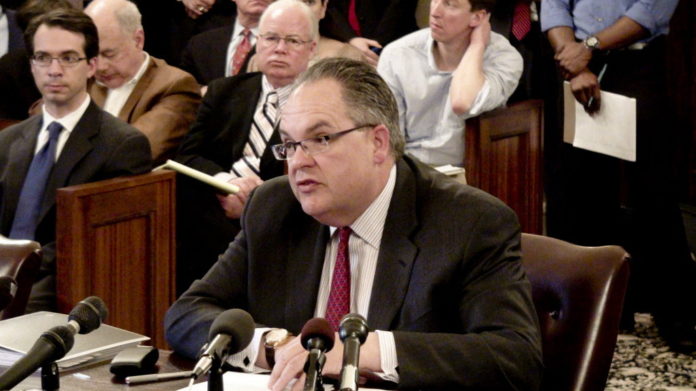
BOSTON – Fidelity Investments’ Ronald O’Hanley defended the firm’s record of preserving jobs in Massachusetts after legislators questioned him for accepting taxpayer-funded incentives while moving staff out of state.
Mark Montigny, state Senate chairman of the Post Audit and Oversight Committee, called Tuesday’s hearing to discuss potential penalties after Boston-based Fidelity, the second-largest U.S. mutual-fund company, said March 15 it was closing offices with about 1,100 employees. Most of the workers will be relocated to New Hampshire and Rhode Island.
Mutual-fund companies in Massachusetts will save an estimated $136 million this year as a result of tax breaks the state started offering employers in 1996, Revenue Commissioner Navjeet Bal said at the hearing. Bal and O’Hanley declined to say how much Fidelity has saved as a result of the incentives. Fidelity is moving staff from Marlborough, after job cuts during the financial decline resulted in 70 percent extra space, O’Hanley said.
“Following the global financial and economic crisis in 2008, Fidelity has 10,000 fewer employees than we had three years ago,” O’Hanley testified. “As a result, we have excess real estate space available at several of our sites.”
Montigny had invited Fidelity Chairman Edward C. “Ned” Johnson III and his daughter, Abigail Johnson, a company president, to testify. O’Hanley, Fidelity’s president of asset management who was hired last year, attended instead.
Payroll Requirements
Fidelity employs about 37,000 people, including 8,400 in Massachusetts. The firm added more than 3,000 mutual-fund jobs in the state through 2002, in exchange for the tax incentives that Massachusetts started offering six years earlier, O’Hanley said at the hearing. Fidelity exceeded the requirements and had employed more than 12,000 people in the state until 2007, O’Hanley said.
Montigny also called the CEO of Evergreen Solar Inc., Michael El-Hillow, to testify at Tuesday’s hearing after the company shut a manufacturing plant and cut about 800 jobs.
Montigny wants companies to be required to return incentive money if they violate the promise implied in taking it: creating jobs in the state.
“Fidelity has not only benefited from massive tax breaks and broken the agreement, but there ought to be very significant clawback provisions for its actions,” Montigny, a Democrat, said in a March 17 interview.
As part of the tax bill passed in 1996, companies were required to create a certain number of jobs to receive the incentives, Montigny said. That requirement ended after five years. The law, which gave companies a permanent tax break in exchange for five years of increasing headcount, now looks like a “lousy deal for taxpayers,” he said.
‘Tens of Millions’
Fidelity has received “tens of millions of dollars” each year in tax breaks since 1996, Robert Tannenwald, a former Boston Federal Reserve Bank vice president and adviser to lawmakers when the fund company pressed the Legislature to pass the measures, said in an interview.
Fidelity hasn’t disclosed the figure and the Massachusetts Department of Revenue is prohibited from doing so, said Robert Bliss, a spokesman for the department, citing the confidentiality of tax information.
Massachusetts Governor Deval Patrick, a Democrat, was “disappointed and deeply frustrated” that he hadn’t been informed of Fidelity’s plans to move the jobs, the Boston Globe reported March 17. Patrick met with Abigail Johnson on March 24 and was told the decision to relocate employees was irreversible, the Globe reported last week.
Evergreen Shutdown
Evergreen Solar, based in Marlborough, said in January it was closing its manufacturing facility in Devens. The company doesn’t plan to return any of its $20 million or so in tax benefits, El-Hillow said at the hearing. He said his firm has met 85 percent of the employment obligations required by the state.
In crafting the 1996 bill, Massachusetts lawmakers feared that Fidelity would move to Rhode Island, which was offering a range of incentives, Tannenwald said. The “bidding war became intense,” with Fidelity representatives pushing Massachusetts politicians to do right by the firm, he recalled.
Anne Crowley, a Fidelity spokeswoman, defended the company earlier this month, when Tuesday’s hearing was scheduled.
“We have met and exceeded our commitments to the state and will continue to do so in the future,” she said in an e-mailed statement. “All of the business decisions we have made over the years are with the intent to keep our company stable, strong and healthy. That is good for our employees and for Massachusetts.”
Fidelity, which is closely held, manages about $1.6 trillion in assets.
‘All the Facts’
Senate President Therese Murray, also a Democrat, said in a statement before Tuesday’s hearing that she wanted “all the facts” behind Fidelity’s decision.
“It is very disappointing to be blindsided by a homegrown company that has benefited greatly from its long relationship with the Commonwealth,” she said.
Fidelity, started by Ned Johnson’s father in 1946, has expanded from its fund-company roots into stock trading, retirement plans and institutional money management. The company over the past decade expanded in states including Florida, Rhode Island and North Carolina.
The firm suffered from investor withdrawals and declining assets during the financial-market crisis in 2008 and 2009, prompting it to reduce jobs and expenses. Vanguard Group Inc., based in Valley Forge, Pa., passed Fidelity last year to become the largest U.S. mutual-fund company by assets, a distinction Fidelity had held for more than two decades.
The company reported a 17 percent increase in operating income for 2010. The figure, which excludes costs such as interest and taxes, rose to $2.94 billion from $2.51 billion a year earlier.












